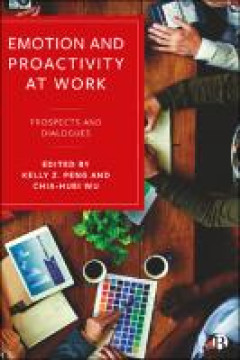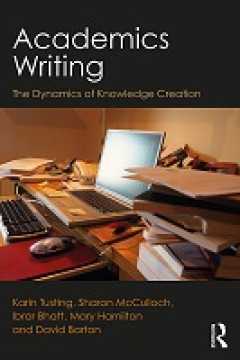Ditapis dengan

E-book Emotion and Proactivity at Work
Individuals’ behaviours at work are known to be shaped by cold, or cognitive-motivational, processes as well as hot, or affect-motivational, processes. To date, employee proactivity research has mainly focused on the ‘cold’ side. But emotion has been proposed to ‘energize’ employees’ proactivity, especially in interdependent and uncertain work environments. In this pioneering work, …
- Edisi
- -
- ISBN/ISSN
- 9781529212631
- Deskripsi Fisik
- -
- Judul Seri
- -
- No. Panggil
- 158.7 PEN e
E-book Olympics 2020
The 2020 Summer Olympics, branded as Tokyo 2020 was an international multi-sport event held from 23 July to 08 August 2021 in Tokyo, Japan, with some preliminary events that began on 21 July. Tokyo was selected as the host city during the 125th IOC Session in Buenos Aires, Argentina, on 07 September 2013. Originally scheduled to take place from 24 July to 09 August 2020, the event was postponed…
- Edisi
- -
- ISBN/ISSN
- -
- Deskripsi Fisik
- -
- Judul Seri
- -
- No. Panggil
- 796.48 KEN o
E-book Quantifying Quality of Life : Incorporating Daily Life into Medicine
There are many ways to define health. Health is defined by the World Health Organization (WHO) as “a state of complete physical, mental and social well-being and not merely the absence of disease or infirmity.” [1, 2] This definition has recently been challenged by a team of international experts who suggested that health be defined as “the ability to adapt and …
- Edisi
- -
- ISBN/ISSN
- 9783030942120
- Deskripsi Fisik
- 595 hlm
- Judul Seri
- -
- No. Panggil
- 610.153 WUL q
E-book A Researcher’s Guide to: Cellular Biology
The International Space Station offers a valuable platform and environment for cell biology investigations, novel discoveries and innovation in a microgravity environment. Areas of opportunity include tissue culture studies, tissue engineering research using 3-D tissue models, biopharmaceutical production, host microbe interactions, host-toxicology interactions, and host-drug sensitivity and re…
- Edisi
- -
- ISBN/ISSN
- -
- Deskripsi Fisik
- 50 halaman, ilus.
- Judul Seri
- -
- No. Panggil
- 520 NAS a
E-book A Researcher’s Guide to: Fruit Fly Research
For decades, researchers have used the fruit fly Drosophila to probe the combined effects of microgravity and other conditions of spaceflight with exposure to ionizing radiation. Drosophila melanogaster provides a well-characterized model organism that is both genetically complex and relatively modest in its habitat and life support requirements. Microgravity exposure, a unique biological chall…
- Edisi
- -
- ISBN/ISSN
- -
- Deskripsi Fisik
- 48 halaman, ilus.
- Judul Seri
- -
- No. Panggil
- 520 NAS a

E-Book Academics Writing: The Dynamics of Knowledge Creation
Academics Writing recounts how academic writing is changing in the contemporary university, transforming what it means to be an academic and how, as a society, we produce academic knowledge. Writing practices are changing as the academic profession itself is reconfigured through new forms of governance and accountability, increasing use of digital resources, and the internationalisation of high…
- Edisi
- -
- ISBN/ISSN
- 9780429582592
- Deskripsi Fisik
- 179 halaman
- Judul Seri
- -
- No. Panggil
- 306.44 TUS a
E-book A Circular Economy in the Netherlands by 2050 : Government-wide Pro…
The circular economy provides an answer to the great challenge of the 21st century, which is to utilise raw materials with much greater efficiency. In order to continue feeding humanity, provide it with the necessary goods and to guarantee people a decent existence, a fundamental change in how we use raw materials is necessary. We are talking about an economy that provides for people’s needs …
- Edisi
- -
- ISBN/ISSN
- -
- Deskripsi Fisik
- 72 hlm
- Judul Seri
- -
- No. Panggil
- 330.9492 DIJ a

RICH DAD POOR DAD FOR TEENS: Rahasia tentang uang yang tidak kaupelajari di s…
- Edisi
- cet. 6
- ISBN/ISSN
- 979-22-1095-4
- Deskripsi Fisik
- xviii; 116 hlm;14,5 x 22,5 cm
- Judul Seri
- -
- No. Panggil
- 658 KIY r
- Edisi
- cet. 6
- ISBN/ISSN
- 979-22-1095-4
- Deskripsi Fisik
- xviii; 116 hlm;14,5 x 22,5 cm
- Judul Seri
- -
- No. Panggil
- 658 KIY r

SPECIAL ENGLISH FOR BUSINESS
- Edisi
- cet. 1
- ISBN/ISSN
- 0-02-971890-2
- Deskripsi Fisik
- 102 pgs;14 x 21 cm
- Judul Seri
- -
- No. Panggil
- 428 ABR s
- Edisi
- cet. 1
- ISBN/ISSN
- 0-02-971890-2
- Deskripsi Fisik
- 102 pgs;14 x 21 cm
- Judul Seri
- -
- No. Panggil
- 428 ABR s

RICH DAD, POOR DAD: Apa Yang Diajarkan Orang Kaya pada Anak-anak Mereka Tenta…
- Edisi
- cet. 4
- ISBN/ISSN
- 979-655-927-7
- Deskripsi Fisik
- xxv; 238 hlm;23 x 15 cm
- Judul Seri
- -
- No. Panggil
- 658 KIY r
- Edisi
- cet. 4
- ISBN/ISSN
- 979-655-927-7
- Deskripsi Fisik
- xxv; 238 hlm;23 x 15 cm
- Judul Seri
- -
- No. Panggil
- 658 KIY r

RICH DAD, POOR DAD: Apa Yang Diajarkan Orang Kaya pada Anak-anak Mereka Tenta…
- Edisi
- cet. 4
- ISBN/ISSN
- 979-655-927-7
- Deskripsi Fisik
- xxv; 238 hlm;23 x 15 cm
- Judul Seri
- -
- No. Panggil
- 658 KIY r
- Edisi
- cet. 4
- ISBN/ISSN
- 979-655-927-7
- Deskripsi Fisik
- xxv; 238 hlm;23 x 15 cm
- Judul Seri
- -
- No. Panggil
- 658 KIY r

PRAHARA KASIH:
- Edisi
- -
- ISBN/ISSN
- 979-22-1093-8
- Deskripsi Fisik
- 232 hlm;11 x 18 cm
- Judul Seri
- -
- No. Panggil
- 823 KEN p
- Edisi
- -
- ISBN/ISSN
- 979-22-1093-8
- Deskripsi Fisik
- 232 hlm;11 x 18 cm
- Judul Seri
- -
- No. Panggil
- 823 KEN p
 Karya Umum
Karya Umum  Filsafat
Filsafat  Agama
Agama  Ilmu-ilmu Sosial
Ilmu-ilmu Sosial  Bahasa
Bahasa  Ilmu-ilmu Murni
Ilmu-ilmu Murni  Ilmu-ilmu Terapan
Ilmu-ilmu Terapan  Kesenian, Hiburan, dan Olahraga
Kesenian, Hiburan, dan Olahraga  Kesusastraan
Kesusastraan  Geografi dan Sejarah
Geografi dan Sejarah